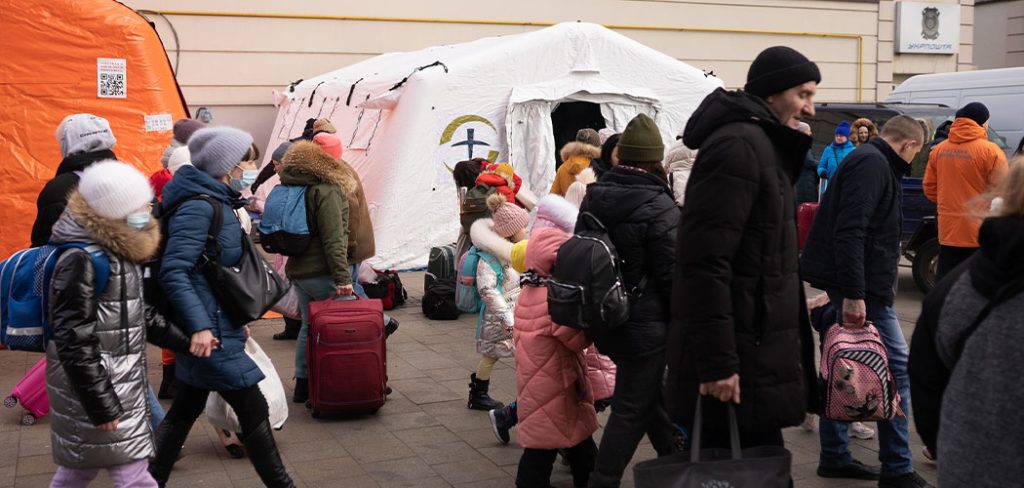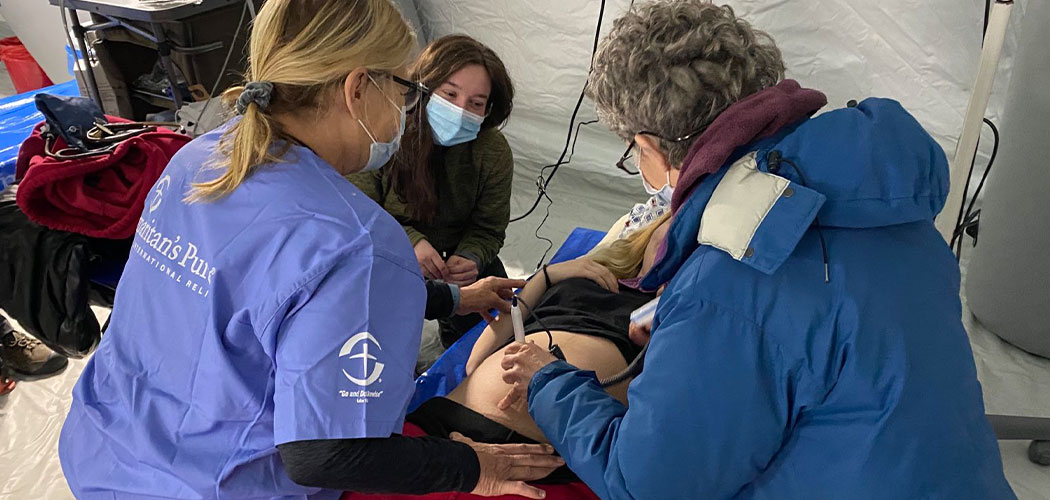My husband and I were deployed to Ukraine to work in an Emergency Field Hospital (EFH) with International Relief Agency, Samaritan’s Purse (SP), following the full-scale invasion by Russia the previous February, 24 May 2022.
The journey from Poland was eerie as our bus of aid workers was the only vehicle on the motorway headed for Ukraine. I had seen footage of Russian tanks blocking roads and firing on civilian vehicles, so I was apprehensive to say the least.
We were taken straight to the EFH, situated in an underground carpark in Lviv as a means of protection from rocket and missile attack.
The EFH comprised of an emergency department, an operating theatre, PACU and one ward. Our accommodation tents were also in the carpark which was quite dark with the lighting being controlled by the shopping mall above. We had light from 8am-9pm. Our shifts were 8am-8pm so breakfast and after work time was spent in the dim auxiliary lighting.
After three days working in PACU I was put in charge of the Mobile Medical Unit (MMU) where my role, in addition to sourcing and inspecting locations for clinics, included attending dressings, providing medications and data entry. The shopping mall above us was fully functional so we could go there or outside for short walks to get away from the darkness.
The MMU had three teams, two operated in and around Lviv while one operated out of the bus station where they treated internally displaced people (IDP’s) fleeing the occupied zone. There had been a clinic at the train station until it had been bombed.
IDP’s fled from areas such as Donetsk, Lugansk, Mariupol, Kherson, Kharkiv in the east. They escaped with only what they could carry in a shopping bag or backpack, mostly this didn’t include medications. In the bus station clinic staff had between 12 minutes and one hour to assess and treat patients depending on when their next bus would come to take then further from the war.
Most of the IDP’s although Ukrainian were Russian speaking and on arrival in Lviv, found themselves in an unfamiliar city with a different language. They had no home, no medication, no access to medical care. They were housed wherever there was space, so we held clinics in schools, universities, sports centres, camping grounds, a nursing home and an orphanage.
Some clinics were very busy, others not. In one clinic we saw only six women, all from the east, they felt like failures as they couldn’t keep their children safe. There was a lot of hugging. The American doctor said he was glad to wear a mask to hide his tears as he heard their stories. He described such sadness. Another clinic was held at a nursing home. It was full of elderly people also evacuated from the east. One lady just sobbed; she’d had a stroke and her son had brought her to safety and returned to the east, she hadn’t heard from him again. Another described how she ran across a ploughed field with her walking frame to escape the shelling.
We held a clinic in an orphanage where all the children had been evacuated from Mykolaiv due to the bombing. Our mandate was to treat IDP’s and in one clinic we appeared to have failed as only local people came. One of them was a soldier, on a month’s leave due to PTSD. He didn’t want to talk about the war, we knew that he was on the front line and that he had lost many friends. His wife looked exhausted. The soldier made a connection with our Canadian doctor who was of Ukrainian descent and for a while his expression changed, that day we were there just for him.
June saw the end of SP’s operation in Lviv. Between March and June the MMU had treated 3491 patients. During the month we had sixteen air raid alerts, we heard explosions and at night we heard the air defences at work.
October saw us head to Ukraine again. This time as part of a training team, not attached to an EFH. We arrived in Krakow, Poland, where we had three hours to shower, then onto Kyiv via overnight train. This filled me with apprehension as I believed it could be a target for Russian bombers. Four hours in Kyiv saw us receive a security briefing and personal body armour and then another overnight train- this time to Odessa where we met up with our team. On arrival we got handover on the four courses we would teach, Trauma, Burns, IPC and IPC in an ICU setting.

Our first training day, we saw the first escalation of the war by Russia- as well as the usual air raid alerts and ‘shelter in place’ advisories we also received a text stating ‘we are under attack’.
On arrival at our first training site, a hospital in Odessa region, we were escorted straight to the air raid shelter, aka basement, where we spent the entire morning. There was no training that day. The next day however, we conducted our training in the same basement.
From Odessa we headed further east, ending up in Dnipro, teaching courses in local hospitals.
Our classes were anything from 15 nurses and doctors to 139. It was so wonderful to meet all these health care colleagues and be able to support them. They were so welcoming and so grateful that the world had not forgotten them.
The first hospital in Odessa stood out because of the air raid, another was a maternity/women’s and children’s hospital. Here the nurses were used to treating women and children but now they were treating men, wounded soldiers straight from fighting at the front.
They saw first-hand the ravages of war, the horrendous injuries, they heard the stories told by the soldiers. All the time they were thinking of their own husbands/brothers/fathers who were themselves fighting at the front. Still these brave nurses came to work, still they cared for their patients. They painted the basement in bright colours and cartoons so that the children wouldn’t be afraid when they had to shelter there. They brought as many patients as they could to the shelter and stayed on the wards with those who could not be moved. Such care, such dedication. Any of them could have chosen to evacuate but they stayed, and they served their countrymen.
In addition to the foreign staff, we had Ukrainian staff on our teams. They were nurses, translators, drivers, admin staff, and chaplains. Many came from the east, most still had family members in Kharkiv, Kherson, Mykolaiv, they followed the news of the fighting very closely.
One, who worked as a health liaison accessed her home camera via phone every day to see if her house was still standing. Another in our team came from Irpin, he showed photos of the aftermath of the initial Russian invasion, the massacre including multiple friends lying dead in the road.
One Ukrainian medical student graduated while we were there. The next day he went to serve on the front line.
The first time in Ukraine we experienced sixteen air raid alerts, this time we had up to nine air raid alerts a day. Sometimes we took shelter, but if in transit sometimes there was nowhere to hide. Sometimes we had to shelter in place if the threat was high. We stayed away from likely targets.
I am honoured to have worked with nurses and others to provide care to those who need it, not because it’s easy or safe but because as nurses we are family and we support each other.
Lyndsey Ohman is an ANMF (ACT Branch) member









One Response
Lyndsey,
You and your fellow volunteers courage in this environment is admirable. We cannot imagine.
What these poor people continue to go through, year after year, is unimaginable. We thought COVID lockdowns were bad. We have no idea. I hope as Australians, we never know if this horror.
Thank you for your service and for supporting these terribly vulnerable people – what we nurses, do best.